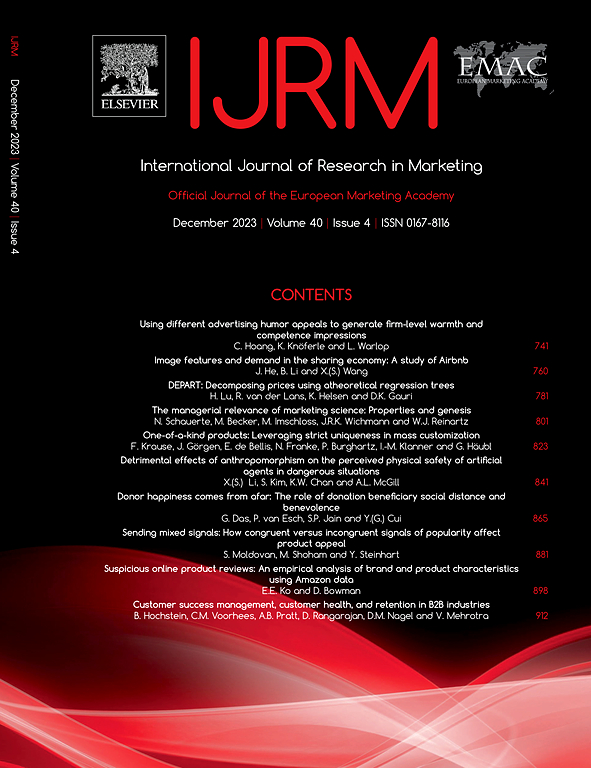这不再是我的了合作消费的阴暗面
IF 7.5
2区 管理学
Q1 BUSINESS
International Journal of Research in Marketing
Pub Date : 2024-12-01
DOI:10.1016/j.ijresmar.2024.05.002
引用次数: 0
摘要
现有的关于共享经济中协作消费的研究通常关注消费者(消费此类服务的人),而忽略了一个重要的参与者:对等服务提供者(通过与其他消费者共享资源来提供这些服务的人)。通过四项研究,我们发现了协同消费的潜在有害副作用。具体来说,我们的研究结果表明,对于对等服务提供者来说,分享他们的资产会导致对这些资产的心理所有权的更大的感知损失。因此,这种现象导致了一个潜在的不可持续的结果:更快地处置共享资产。作者进一步表明,当资产与群体内(与群体外)成员共享时,这种效应就会消失。最后,作者提供了一个实用且易于实施的解决方案,可以避免这种潜在的有害现象:鼓励服务提供商个性化他们的资产,从而恢复他们感知到的心理所有权。总之,这些结果推动了文献对合作消费黑暗面的研究,并为管理提供了缓解策略的见解。本文章由计算机程序翻译,如有差异,请以英文原文为准。
This is not mine anymore: The dark side of collaborative consumption
Extant research on collaborative consumption in the sharing economy generally focuses on consumers (those who consume such services) while overlooking an important actor: the peer service providers (those who provide these services by sharing their resources with other consumers). Through four studies, we show a potential detrimental side effect of collaborative consumption. Specifically, our results suggest that for peer service providers, sharing their assets leads to a greater perceived loss of psychological ownership of these assets. This phenomenon thus results in a potentially unsustainable outcome: faster disposal of the shared assets. The authors further show that this effect disappears when the asset is shared with in-group (vs. out-group) members. Lastly, the authors offer a practical and easily implementable solution that could avert this potentially detrimental phenomenon: To encourage service providers to personalize their assets, which restores their perceived psychological ownership. Together, these results advance the literature on the dark side of collaborative consumption and offer managerial insights into mitigating strategies.
求助全文
通过发布文献求助,成功后即可免费获取论文全文。
去求助
来源期刊
CiteScore
11.80
自引率
4.30%
发文量
77
审稿时长
66 days
期刊介绍:
The International Journal of Research in Marketing is an international, double-blind peer-reviewed journal for marketing academics and practitioners. Building on a great tradition of global marketing scholarship, IJRM aims to contribute substantially to the field of marketing research by providing a high-quality medium for the dissemination of new marketing knowledge and methods. Among IJRM targeted audience are marketing scholars, practitioners (e.g., marketing research and consulting professionals) and other interested groups and individuals.

 求助内容:
求助内容: 应助结果提醒方式:
应助结果提醒方式:


